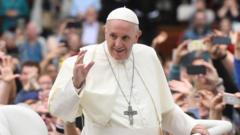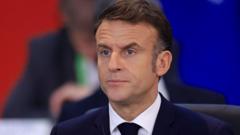The election process in Ecuador took an unexpected turn as the first round concluded with a "technical tie," pushing the race to a decisive run-off scheduled for April. Daniel Noboa, the incumbent center-right president, and Luisa González, his left-wing opponent, found their voter percentages alarmingly close, indicative of a challenging second phase ahead.
Ecuador's Presidential Election in 'Technical Tie' Leading to Run-Off

Ecuador's Presidential Election in 'Technical Tie' Leading to Run-Off
Ecuador's tightly contested presidential election results in a second round due to nearly equal votes for the leading candidates.
The electoral authorities' declaration of a "technical tie" reflects the unexpected outcomes that diverged from earlier opinion polls, which had suggested a more comfortable lead for Noboa. Supporters of the incumbent gathered energetically in Quito, armed with Noboa-themed merchandise and cardboard cut-outs adorned with various outfits—demonstrating strong grassroots support as they rallied for victory.
Addressing critical issues surrounding security and energy, Noboa's administration has been defined by his aggressive approach to dealing with gang violence through emergency military measures, which numerous supporters cite as pivotal for public safety. Citizens like Fernanda Iza expressed confidence in Noboa's continued leadership, attributing personal and communal stability to his ongoing policies against crime.
Conversely, González emerged as the voice for those advocating change, particularly focusing on deeper social spending in areas afflicted by violence and poverty. Her supporters, like Gonzalo Cajas, emphasized the urgency for addressing fundamental issues, arguing that security challenges cannot be fought without tackling underlying social disparities.
Voter sentiments reveal an array of perspectives on the election's prospects. While some believe Noboa will successfully secure a broader voter base in the run-off, others, such as Gabriela Cajo, critique both candidates for a perceived lack of progress and express frustration over the political process, underscoring the potential for increased polarization during the upcoming election.
As the nation anticipates the second round, it is clear that the victorious candidate will be tasked with addressing Ecuador's multifaceted challenges, including rampant crime due to drug cartels, a struggling economy, high unemployment, and the lingering effects of last year's energy crisis. As both candidates put forth their plans for job creation, economic reform, and social investment, the stage is set for a consequential political battle in the coming months.
Addressing critical issues surrounding security and energy, Noboa's administration has been defined by his aggressive approach to dealing with gang violence through emergency military measures, which numerous supporters cite as pivotal for public safety. Citizens like Fernanda Iza expressed confidence in Noboa's continued leadership, attributing personal and communal stability to his ongoing policies against crime.
Conversely, González emerged as the voice for those advocating change, particularly focusing on deeper social spending in areas afflicted by violence and poverty. Her supporters, like Gonzalo Cajas, emphasized the urgency for addressing fundamental issues, arguing that security challenges cannot be fought without tackling underlying social disparities.
Voter sentiments reveal an array of perspectives on the election's prospects. While some believe Noboa will successfully secure a broader voter base in the run-off, others, such as Gabriela Cajo, critique both candidates for a perceived lack of progress and express frustration over the political process, underscoring the potential for increased polarization during the upcoming election.
As the nation anticipates the second round, it is clear that the victorious candidate will be tasked with addressing Ecuador's multifaceted challenges, including rampant crime due to drug cartels, a struggling economy, high unemployment, and the lingering effects of last year's energy crisis. As both candidates put forth their plans for job creation, economic reform, and social investment, the stage is set for a consequential political battle in the coming months.




















